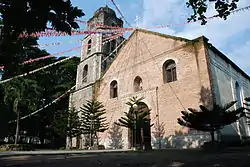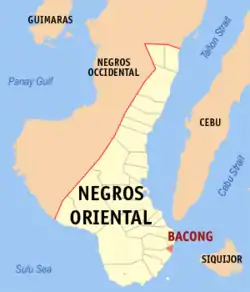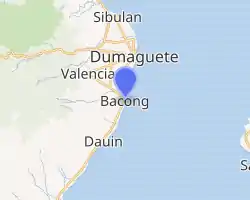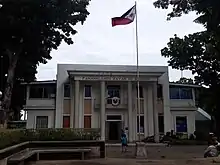Bacong
Bacong, officially the Municipality of Bacong, is a 4th class municipality in the province of Negros Oriental, Philippines. According to the 2015 census, it has a population of 36,527 people. [3]
Bacong | |
|---|---|
| Municipality of Bacong | |
 St. Augustine Church, Bacong, Negros Oriental | |
 Map of Negros Oriental with Bacong highlighted | |
OpenStreetMap 
| |
.svg.png.webp) Bacong Location within the Philippines | |
| Coordinates: 9°14′47″N 123°17′41″E | |
| Country | |
| Region | Central Visayas (Region VII) |
| Province | Negros Oriental |
| District | 3rd district |
| Barangays | 22 (see Barangays) |
| Government | |
| • Type | Sangguniang Bayan |
| • Mayor | Lenin P. Alviola |
| • Vice Mayor | Jocelyn A. Alviola |
| • Representative | Arnolfo A. Teves Jr. |
| • Electorate | 22,292 voters (2019) |
| Area | |
| • Total | 40.30 km2 (15.56 sq mi) |
| Elevation | 42 m (138 ft) |
| Population | |
| • Total | 36,527 |
| • Density | 910/km2 (2,300/sq mi) |
| • Households | 8,255 |
| Economy | |
| • Income class | 4th municipal income class |
| • Poverty incidence | 25.71% (2015)[4] |
| • Revenue | ₱91,715,678.37 (2016) |
| Time zone | UTC+8 (PST) |
| ZIP code | 6216 |
| PSGC | |
| IDD : area code | +63 (0)35 |
| Climate type | tropical climate |
| Native languages | Cebuano Tagalog |
Bacong was the hometown of the Visayan hero of the Philippine Revolution, Pantaleon Villegas, better known as León Kilat.
History
Bacong was founded 1801 as a coastal settlement. It is the Province's first town south of the Capital. The famed Church of San Agustin de Hippo and its monastery's construction was started in 1866 by Fray Leandro Arrúe Agudo. two years after he became the town's parish priest in 1864 as part of the Augustinian Recollects missionary work. The monastery now serves a retreat house. The stone churchhouse boasts the Province's tallest belfry and oldest main altar, adorned with gold-leafing and painted friezes. Its choir holds a pipe organ from Zaragoza, Spain, installed in 1898 shortly before the revolution against Spain broke out in Negros Oriental. The only other pipe organ of similar provenance is found in Bohol. With its reasonably well-preserved complex including churchyard and convent (ca 1850), the San Agustin of Hippo Church in Bacong is one of the 26 colonial churches all over the country selected for restoration by the National Commission for Culture and the Arts.
Bacong's historical importance is well-monumented: it is the birthplace of Negros Oriental's hero and only Katipunero – General Pantaleon Villegas, aka Leon Kilat, whose birthday is celebrated every July 27. Barrio Isugan was the site of a battle between Filipino and American soldiers.
Beginning the Second World War, Japanese Imperial forces were entered and occupied in Bacong in 1942. Filipino soldiers and guerrillas were encounter by the Japanese Imperial forces start the conflicts from 1942 to 1945 during the occupation. When Allied forces liberated in Bacong was fought against the Japanese Occupation until the end in World War II in 1945. The general headquarters of the Philippine Commonwealth Army and Philippine Constabulary was active in 1945 to 1946 in Bacong during and aftermath in World War II.
Points of touristic interest are a string of beaches the length of the Bacong shoreline, sinamay hand looms, and the Negros Oriental Arts and Heritage (NOAH) which produces export quality stone craft furniture, jewel boxes and fashion accessories.
One of the town's bigger barangays, San Miguel, marks its local fiesta with a unique Sinulog de San Miguel, where the archangel and his heavenly army are depicted battling the forces of evil.[5]
Geography
Barangays
Bacong is politically subdivided into 22 barangays.
- Balayagmanok
- Banilad
- Buntis
- Buntod
- Calangag
- Combado
- Doldol
- Isugan
- Liptong
- Lutao
- Magsuhot
- Malabago
- Mampas
- North Poblacion
- Sacsac
- San Miguel
- South Poblacion
- Sulodpan
- Timbanga
- Timbao
- Tubod
- West Poblacion
Climate
| Climate data for Bacong, Negros Oriental | |||||||||||||
|---|---|---|---|---|---|---|---|---|---|---|---|---|---|
| Month | Jan | Feb | Mar | Apr | May | Jun | Jul | Aug | Sep | Oct | Nov | Dec | Year |
| Average high °C (°F) | 30 (86) |
30 (86) |
31 (88) |
33 (91) |
32 (90) |
31 (88) |
30 (86) |
30 (86) |
30 (86) |
29 (84) |
30 (86) |
30 (86) |
31 (87) |
| Average low °C (°F) | 22 (72) |
22 (72) |
22 (72) |
23 (73) |
24 (75) |
25 (77) |
24 (75) |
24 (75) |
24 (75) |
24 (75) |
23 (73) |
23 (73) |
23 (74) |
| Average precipitation mm (inches) | 26 (1.0) |
22 (0.9) |
28 (1.1) |
41 (1.6) |
95 (3.7) |
136 (5.4) |
147 (5.8) |
126 (5.0) |
132 (5.2) |
150 (5.9) |
98 (3.9) |
46 (1.8) |
1,047 (41.3) |
| Average rainy days | 7.5 | 6.7 | 8.9 | 10.4 | 21.6 | 25.6 | 26.3 | 25.0 | 24.1 | 26.2 | 19.2 | 12.1 | 213.6 |
| Source: Meteoblue (Use with caution: this is modeled/calculated data, not measured locally.) [6] | |||||||||||||
Demographics

|
| ||||||||||||||||||||||||||||||||||||||||||||||||
| Source: Philippine Statistics Authority [3] [7] [8][9] | |||||||||||||||||||||||||||||||||||||||||||||||||
Education
Public High Schools
| School Name | Location |
|---|---|
| Buntod National High School | Buntod |
| Ong Che Tee - Bacong National High School | Sacsac |
| San Miguel National High School | San Miguel |
| Isugan National High School | Isugan (Planned) |
| Magsuhot National High School | Magsuhot (Planned) |
Private Schools
| School Name | Location |
|---|---|
| Bacong Holy Family High School | West Poblacion |
| Divine Grace International Christian School | Buntis |
| Bacong Science High School | Central Poblacion |
| DLHOH Institute Learning Center | North Poblacion |
Elementary Schools
| School Name | Location |
|---|---|
| Bacong Central School | West Poblacion (Town Proper) |
| Buntod Elementary School | Buntod |
| Calangag Elementary School | Calangag |
| Fausto M. Sarono - Tubod Elementary School | Tubod |
| Isugan Elementary School | Isugan |
| Nazario Tale Memorial Elementary School | Banilad |
| Sacsac Elementary School | Sacsac |
| San Miguel Elementary School | San Miguel |
| Timbanga Elementary School | Timbanga |
| Timbao Elementary School | Timbao |
References
- Municipality of Bacong | (DILG)
- "Province:". PSGC Interactive. Quezon City, Philippines: Philippine Statistics Authority. Retrieved 12 November 2016.
- Census of Population (2015). "Region VII (Central Visayas)". Total Population by Province, City, Municipality and Barangay. PSA. Retrieved 20 June 2016.
- "PSA releases the 2015 Municipal and City Level Poverty Estimates". Quezon City, Philippines. Retrieved 12 October 2019.
- "Negros Oriental Tourism", About | Cities & Towns. Retrieved 2013-05-28.
- "Bacong: Average Temperatures and Rainfall". Meteoblue. Retrieved 6 May 2020.
- Census of Population and Housing (2010). "Region VII (Central Visayas)". Total Population by Province, City, Municipality and Barangay. NSO. Retrieved 29 June 2016.
- Censuses of Population (1903–2007). "Region VII (Central Visayas)". Table 1. Population Enumerated in Various Censuses by Province/Highly Urbanized City: 1903 to 2007. NSO.
- "Province of". Municipality Population Data. Local Water Utilities Administration Research Division. Retrieved 17 December 2016.
- "dumaguete.com".
External links
| Wikimedia Commons has media related to Bacong, Negros Oriental. |